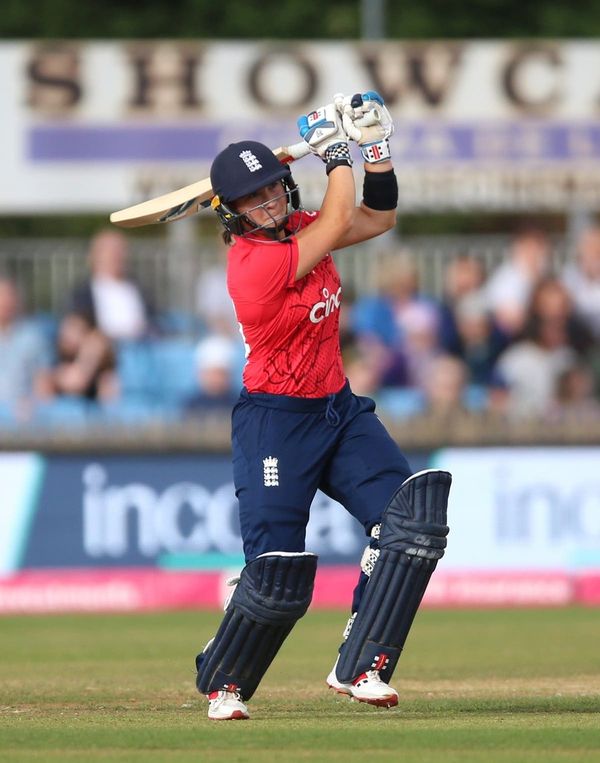
After the best part of a century, then, the England cricket team finally made their debut in the Commonwealth Games. The firework smoke had not even cleared when Katherine Brunt, who had been presented with a ceremonial cap before the start of play to mark the start of her 100th international T20 match, dismissed Vishmi Gunaratne lbw with the very first delivery. For a minute Brunt seemed to be the only person in Edgbaston who had realised what had happened, and her appeal echoed out loudly around the stunned ground. And then the umpire’s finger went up and everyone else joined in with her.
The place was about a third full, which was a fair turnout by the standards of some of the events at the Games, but considerably less than the organisers had promised were going to attend. England’s games were supposed to be all sold out.
Still, they were a loud, happy, enthusiastic crowd. And it was at least a better turnout than the last time the sport was included in the Commonwealths. When the men played a 50-over tournament at Kuala Lumpur in 1998 the England team did not bother to show up because it clashed with the County Championship, which gives an idea of how priorities have shifted in the last 24 years.
Back then, the authorities were not sure they needed the Commonwealth Games. This time, their participation is a crucial part of the sport’s bid to prove it should be included in the Olympics. Cricket has been left off from the provisional list of sports for Los Angeles 2028, but there is a chance it may yet be included when the organisers make the final decision later next year. The ICC has reportedly spent $3m on lobbying to try to persuade them to do it, too. Whether it is a success or not will likely depend on whether the Board of Control for Cricket in India buy into the idea enough to sell it on to the International Olympic Committee.
But England did their part by playing well here. Too well, in fact, in that they made a mismatch of it. Brunt’s first two overs cost only five runs, and since Sophie Ecclestone dismissed Hasini Perera caught and bowled in her very first over, Sri Lanka were 35 for two at the end of the powerplay.

Their best batter, Chamari Athapaththu, was still in though, so there was some hope. Until the 17-year-old Freya Kemp came on and bowled her with her first delivery, a superb off-cutter that went past Athapaththu’s outside edge and flush into her off stump.
The innings dribbled out after that. Between Brunt, Ecclestone, Kemp, Sarah Glenn and Issy Wong, England’s bowling was altogether too much for a flailing Sri Lankan batting lineup, who struggled to cobble together a hundred runs between them. Nat Sciver, standing in as captain while Heather Knight recovers from a hip injury, had a Swiss Army knife of an attack to work with: right and left arm fast, leg-spin, off-spin, slow-left-arm and her own medium pace. They could go a long way in this tournament before they come across a problem they don’t have a solution for somewhere in there.
Here, it was Wong and Kemp who tore out the middle order, then Ecclestone, who took two of her three in the final over, mopping up the tail. The chase wasn’t entirely straightforward, the pitch was a little too tricky for that. England lost both openers in the powerplay, Danni Wyatt caught at mid-off before she could really get started, and Sophia Dunkley, bowled by a slower ball, soon after she had.
One of the leading contenders for the men’s marathon at the Commonwealth Games was forced to watch the event from the sidelines after Kenyan officials apparently entered the wrong Eric for the event.
Eric Kiptanui, who has named in the Kenyan squad in May, was supposed to compete but when he arrived at the start line he found that somehow a 21-year-old runner called Eric Kiplagat Sang had being entered instead. Sang, who has never competed in a marathon, wasn’t on the team or even in Birmingham, so didn’t start.
Kiptanui, whose personal best of 2hr 5min 47sec would have made him the third-fastest man in the field, was ready to run but by the time the mistake was discovered, it was too late to change the paperwork. He ended up watching the race from the other side of the barriers.
The race was eventually won by Uganda’s Victor Kiplangat in 2hr 10min 55sec, despite the fact he took a wrong turn while trying to navigate his way around a bus lane and had to double back on himself for 30 metres. He was still a minute-and-a-half ahead of Alphonce Simbu from Tanzania, who won silver with Kenya's Michael Githae third.
There was more Kenyan confusion in the women’s race, where Margaret Muriuki ended up competing on her own even though her teammates Stella Barsosio and Purity Changwony had been picked to run with her. The race was won Australia’s Jessica Stenson with Muriuki third behind Namibia’s Helalia Johannes. Andy Bull
Sciver steadied things in partnership with 17-year-old Alice Capsey, who pressed on with Maia Bouchier after Sciver was out lbw. Capsey eventually got herself stumped for 44 trying to hit the winning runs, which Bouchier duly did by creaming a four down the ground.
The way she did it suggested England have more in them. They will need it, too. Earlier in the day, New Zealand beat South Africa by 13 runs in the first game in Group B, thanks to a brilliant 91 not out off 64 balls by Suzie Bates and the all-round efforts of their captain, Sophie Devine, who scored 48 and then took three for 37 as South Africa were bowled out for 154. England play South Africa next, on Tuesday, and New Zealand two days after that, so it feels as though it is uphill all the way to the semi-finals.
In the meantime, everyone’s attention will be on India’s match against Pakistan on Sunday. Given participation in the Olympics hinges on viewing figures in south-east Asia, there will be even more riding on that one than there usually is when the two countries meet.










